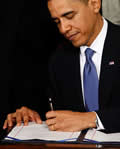Take Care Now: Stare Decisis and the President’s Duty to Defend Acts Of Congress - Podcast
Federalism & Separation of Powers Practice Group Podcast
 The recent debate over President Obama’s enforcement of immigration laws and the Affordable Care Act has focused attention on a President’s duty to enforce federal statutes, arising from his constitutional obligation to “Take Care that the Laws be faithfully executed.” Also arising from the Take Care Clause is a President’s distinct duty to defend the constitutionality of federal laws when they are challenged in court, a duty whose scope was hotly debated when Attorney General Eric Holder announced that the Justice Department would not defend section 3 of the Defense of Marriage Act. Some scholars – most notably Professors Neal Devins and Saikrishna Prakash – argue that a presidential duty to defend federal statutes lacks any sound constitutional basis and is unnecessary (see their paper, "The Indefensible Duty to Defend"). However, recent United States Attorneys General – with the possible exception of Attorney General Holder – have agreed that the President has such a duty, subject only to narrow exceptions for laws that are transparently unconstitutional or that the President believes unconstitutionally encroach upon executive power.
The recent debate over President Obama’s enforcement of immigration laws and the Affordable Care Act has focused attention on a President’s duty to enforce federal statutes, arising from his constitutional obligation to “Take Care that the Laws be faithfully executed.” Also arising from the Take Care Clause is a President’s distinct duty to defend the constitutionality of federal laws when they are challenged in court, a duty whose scope was hotly debated when Attorney General Eric Holder announced that the Justice Department would not defend section 3 of the Defense of Marriage Act. Some scholars – most notably Professors Neal Devins and Saikrishna Prakash – argue that a presidential duty to defend federal statutes lacks any sound constitutional basis and is unnecessary (see their paper, "The Indefensible Duty to Defend"). However, recent United States Attorneys General – with the possible exception of Attorney General Holder – have agreed that the President has such a duty, subject only to narrow exceptions for laws that are transparently unconstitutional or that the President believes unconstitutionally encroach upon executive power.
In their article “Take Care Now: Stare Decisis and the President’s Duty to Defend Acts Of Congress” in the Harvard Journal of Law & Public Policy, authors Curt Levey and Ken Klukowski argue for a strong presidential duty to defend, including a duty to defend even statutes alleged to be transparently unconstitutional where the administration’s defense is the only way to facilitate a judicial determination of constitutionality. Levey and Klukowski contend that a strong duty to defend is necessary to maintain the separation of powers under which the judiciary serves as the final voice in constitutional challenges, to prevent Presidents from enacting a form of post-enactment veto of legislation they dislike, and – like the judicial doctrine of stare decisis – to provide federal law with stability and predictability.
- Prof. Neal E. Devins, Goodrich Professor of Law, Cabell Research Professor, Professor of Government, Director, Institute of Bill of Rights Law and Director, Election Law Program, William & Mary Law School
- Curt A. Levey, President and Executive Director, The Committee for Justice






